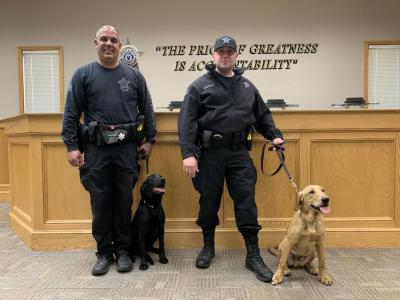Sheriff’s office canines trained to detect Covid-19
Bristol County Sheriff's Office canines use their noses to keep the public safe. Trained four-legged officers can detect heroin, fentanyl and other dangerous drugs; firearms, ammunition and explosives; and even missing or in-distress individuals.
This unit can add another distinction to its mantle: The Bristol County Sheriff's Office is the first law enforcement organization in the U.S. to have canines trained to detect COVID-19.
"Bristol County and the Commonwealth of Massachusetts have come so far since the pandemic started last year," Bristol County Sheriff Thomas M. Hodgson said. "Today, festivals are happening, restaurants are full and concert venues are packed. We've made so much progress, and our new COVID-19 detection program is one way the people of Bristol County can stay ahead of the curve."
Similar to drugs and weapons, COVID-19 has a unique odor which two Bristol County Sheriff's Office dogs are trained to detect. The program was developed by Florida International University's International Forensic Research Institute, which used a similar program for dogs that could detect fungus in crops and adapted it to COVID detection. Florida International University uses canines for COVID detection on its Florida campus.
"This is all science," Capt. Paul Douglas of the sheriff’s office said during a small canine graduation ceremony held recently. "This program was developed by professors, doctors and scientists at FIU, and we couldn't be more proud or excited to execute it here in Bristol County."
Two canine teams attached to the sheriff’s office are trained in COVID detection: Capt. Douglas and his partner Huntah, and Officer Theodore Santos and his partner Duke. Huntah (Hunter with a Boston accent) is a nine-month-old female black lab and Duke is a nine-month-old male golden lab/retriever mix.
Florida International University officials provided medical masks worn by COVID-positive patients for the training odors. An ultraviolet system was used on the masks that kills the contagious portion but leaves the COVID odor, making it safe for the canines and officers to use as training tools. The Sheriff's Office is working with the New Bedford Fire Department and local EMS providers to acquire masks worn by local COVID patients for future training aids.
Lt. Kenneth Almeida and Sgt. William Dillingham of the sheriff’s office led the training program the past few months for Douglas and Santos. In the months ahead, Huntah and Duke will also be trained in locating missing people.
The COVID detection program, in which the dogs can also detect the advanced variants such as the Delta variant, is not a substitute for a COVID test, Douglas said.
"It's best to think of it as a decontamination tool," Capt. Douglas said. "The dogs can detect the COVID odor on a counter or table if it was recently touched by a COVID-positive individual, or even detect the odor on a tissue used by someone with COVID."
Hodgson and Douglas thanked Dr. David and Jane Askew from Dartmouth Dental for the donation to purchase Huntah and Duke, and Kathy Costa of Katz Pet Supply in Somerset, who donates the dog food for Huntah, Duke and the other canines from the sheriff’s office, Fall River and Somerset police departments.
The BCSO COVID canines are available to schools, town buildings, non-profits, nursing homes, Councils on Aging, public safety facilities, medical facilities and more across Bristol County. Anyone interested can send a request letter to Sheriff Hodgson, 400 Faunce Corner Road, Dartmouth, Ma 02747.
Public safety organizations seeking an urgent COVID sweep can contact Capt. Douglas at pauldouglas@bcso-ma.org or Supt. Steven Souza at stevensouza@bcso-ma.org.













